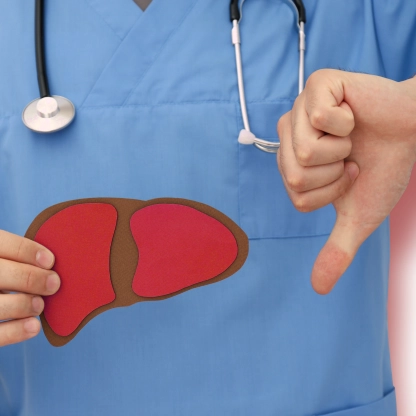
Article summary
Topic
Phospholipids are naturally occurring organic chemical compounds. They are building blocks of the membranes that surround the cells of all living organisms. In the human body, phospholipid are present at particularly high concentrations in the bone marrow, brain, liver and heart. Those phospholipids that contain essential fatty acids are called “essential phospholipids”.
The most important phospholipid from the point of view of normal functioning of the liver is phosphatidylcholine (phospholipids linked to a choline molecule). It represents about 40% of the pool of all phospholipids that form cell membranes.1 In almost each case of liver injury, regardless of its cause, the cell membranes of hepatocytes are damaged.1
Why is phosphatidylcholine essential for your liver?
Phosphatidylcholine is a nutrient that is necessary for proper functioning of the body
Phosphatidylcholine (phospholipids linked to a choline molecule) is a large biological molecule that is a universal building block of cell membranes. It participates in many important processes:
Phosphatidylcholine deficiency may have an effect on the liver:
It can lead to steatosis and liver dysfunction.1
Is phosphatidylcholine necessary only for the liver?
As the main ingredient of all cell membranes of all cells, phosphatidylcholine plays different functions in the body:3
- it supports metabolism,
- it delays ageing processes,
- it supports functioning of the nervous system,
- it enhances concentration and memory,
- it reduces the risk of atherosclerosis.
Phospholipids with a high level of phosphatidylcholine that carries essential unsaturated fatty acids provide clinically proven benefits in the treatment of liver diseases
As demonstrated by research studies, essential phospholipids delivered to the body are incorporated into the damaged cell membranes of the liver cells and contribute to hepatic regeneration through increasing metabolic activity and stimulating regeneration of hepatocytes (liver cells).
The positive effect of essential phospholipids with a high concentration of phosphatidylcholine has been confirmed in the treatment of diseases of liver diseases of different origins:
Alcoholic and non-alcoholic fatty liver disease
Toxic liver injury (medicines, illicit drugs)
In the treatment of biliary tract dysfunction
Adjunctively in viral hepatitis.4
Accelerate liver regeneration with Phospholipids (Essentiale® Forte P)
Where can you find phospholipids with phosphatidylcholine?
Taking daily 800 mg of phosphatidylcholine with food can significantly accelerate hepatic regeneration.4
- Kozłowska-Wojciechowska M. Niezbędne fosfolipidy. Terapia June 2014;6 No. 2 (307):13-15
- Aleynik S.I., Lieber C.S. Polyenylphosphatidylcholine corrects the alcohol-induced hepatic oxidative stress by restoring s-adenosylmethionine Alcohol Alcohol May-Jun 2003;38(3):208-12. https://pubmed.ncbi.nlm.nih.gov/12711653/ accessed on: 14/05/2021
- Siepka E. et al. Charakterystyka aktywności biologicznej Fosfolipidów żółtka; Żywność. Nauka. Technologia. Jakość, 2015, 2 (99), 15 – 28
- Kidd P. Phosphatidylcholine: A Superior Protectant Against Liver Damage Alt Med Rev 1996;1(4):258-274
%20(1)%20(1).webp)



